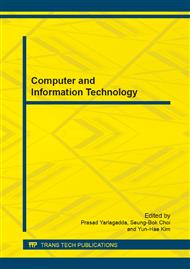[1]
FOSTER I, KESSELMAN C. The Grid: Blueprint for a Future Computing Infrastructure. USA: Morgan Kaufmann Publishers, (1999).
Google Scholar
[2]
FOSTER I, KESSELMAN C, NICK J M, TUECKE S. Grid service for distributed system integration. IEEE computer, 2002, 35(6): 37-46.
DOI: 10.1109/mc.2002.1009167
Google Scholar
[3]
YU J, BUYYA R. Taxonomy of scientific workflow systems for Grid computing. SIGMOD RECORD 2005, 34 (3): 44- 49.
DOI: 10.1145/1084805.1084814
Google Scholar
[4]
BLYTHE J, JAIN S, DEELMAN E, et al. Task scheduling strategies for workflow-based applications in grids. IEEE International Symposium on Cluster Computing and Grid, Cardiff, Wales. UK, 2005. 759-767.
DOI: 10.1109/ccgrid.2005.1558639
Google Scholar
[5]
ZHANG Xiao-dong, LI Xiao-ping, WANG Qian, YUAN Ying-chun. Hybrid particle swarm optimization algorithm for cost minimization in service-workflows with due dates. Journal on Communications. 2008, 29: (87-93).
Google Scholar
[6]
XiaoDong Zhang, JinCheng Zhang, FanYu Zeng. A multi-objective PSO algorithm based Niche Technique for service-workflows scheduling. Advanced Materials Research. 2013. 811: 487-494.
DOI: 10.4028/www.scientific.net/amr.811.487
Google Scholar
[7]
Davulcu H, Kifer M, Rarnakrishnan C R, et a1. Ramakrishnan. Logic based modeling and analysis of workflows. In: Proceedings of the Seventeenth ACM SIGACT- SIGMDD- SIGART Symposium on Principles of Database Systems. 1998. 25-33.
DOI: 10.1145/275487.275491
Google Scholar
[8]
Julia S. de Oliveira F F . A p-time hybrid Petri net model for the scheduling problem of workflow management systems. In: Proceedings of the IEEE International Conference on Systems, Manand Cybernetics. 2004. 5: 4947-4952.
DOI: 10.1109/icsmc.2004.1401315
Google Scholar
[9]
Shen Minxin. Tzeng G-H, Liu D-1L Multi-criteria task assignment in workflow management systems. In: Proceedings of the 36th Hawaii International Conference on System Sciences. 2003. 9.
DOI: 10.1109/hicss.2003.1174458
Google Scholar
[10]
Lee K M Adaptive resource scheduling for workflows considering competence and preference. In: Negoita M Gh, et a1. eds. KES 2004, LNAI 3214, Sprlnger-Verlag, Berlin, Heidelberg, 2004. 723-730.
DOI: 10.1007/978-3-540-30133-2_95
Google Scholar
[11]
Tramontina G B, Wainer J, Elis C. Applying scheduling techniques to minimize the number of late jobs in workflow systems. In: Proceedings of 2004 ACM Symposium on Applied Computing Nicosia, Cyprus, 2004. 3: 1396-1403.
DOI: 10.1145/967900.968180
Google Scholar


